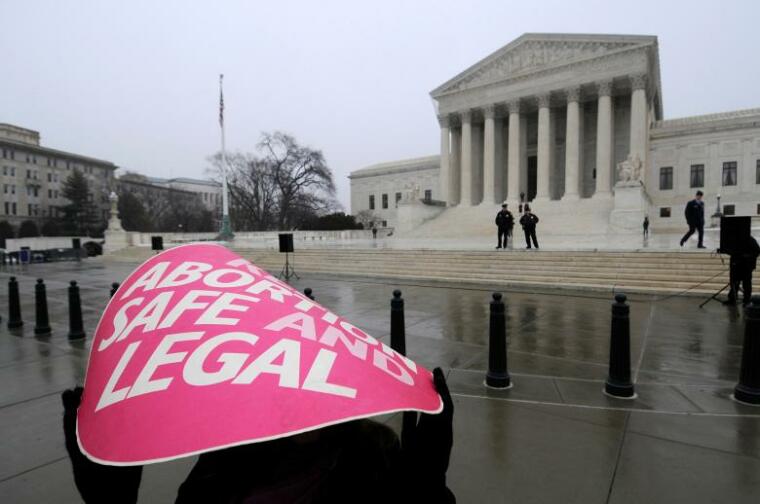Bill that guarantees abortion access in Delaware awaits governor's signature

A bill that would guarantee that abortion remains legal in the state of Delaware in the event that Roe v. Wade gets overturned has been passed by the state legislature and is headed to Gov. John Carney's desk.
On Tuesday, the Delaware state House voted 22–16 to approve a legislature that aims to codify at the state level the provisions of Roe v. Wade, the 1973 Supreme Court that legalized abortion nationwide. The legislation was approved by the Senate last month, and it is now awaiting the signature of the governor.
Carney said he would sign the legislation, which would make Delaware to potentially become the first state to guarantee abortion access since the election of President Donald Trump.
During the campaign period, Trump had promised to appoint Supreme Court justices that would overturn Roe v. Wade and leave it up to the states to decide whether to legalize abortion.
"By taking this step Delaware will be the first state since the election to protect abortion rights," said Elizabeth Nash, a policy analyst with the Guttmacher Institute, which keeps track on abortion policies.
ABC News reported that the measure would strike down the current restrictions on abortion and would allow the procedure to be performed up to the point of viability of the fetus. The legislation defines viability as the point in pregnancy when the fetus is likely to survive outside the uterus without "extraordinary medical measures."
Under current law, abortions beyond 20 weeks of pregnancy are prohibited, and minors who are seeking the procedure are required to obtain permission from their parents.
The bill also allows abortion beyond the point of viability if a doctor determines that the termination of pregnancy is required to protect the woman's life or health, or that the baby is not likely to survive without extraordinary medical measures.
Rep. Timothy Dukes (R-Laurel) described a late-term abortion procedure called dilation and evacuation, in which a fetus is dismembered and removed from the womb, in an unsuccessful attempt to introduce an amendment to prohibit abortion after 20 weeks.
Pro-life advocates have lobbied against the legislation and vowed to take their fight to the governor's office.
"We will exert the same pressure upon Governor Carney, a Catholic, to uphold the sanctity of life for those innocent unborn children whose lives depend upon his vetoing this radical bill," said Delaware Right to Life spokeswoman Moira Sheridan, according to Religion News Service.
In May, the Illinois legislature approved a measure that would safeguard abortion access if Roe v. Wade is overturned, but Republican Gov. Bruce Rauner vowed to veto it. Similar attempts have also been unsuccessful in Connecticut, New Mexico and Rhode Island.
 Christians don't have to affirm transgenderism, but they can’t express that view at work: tribunal
Christians don't have to affirm transgenderism, but they can’t express that view at work: tribunal Archaeology discovery: Medieval Christian prayer beads found on Holy Island
Archaeology discovery: Medieval Christian prayer beads found on Holy Island Presbyterian Church in America votes to leave National Association of Evangelicals
Presbyterian Church in America votes to leave National Association of Evangelicals Over 50 killed in 'vile and satanic' attack at Nigerian church on Pentecost Sunday
Over 50 killed in 'vile and satanic' attack at Nigerian church on Pentecost Sunday Ukrainian Orthodox Church severs ties with Moscow over Patriarch Kirill's support for Putin's war
Ukrainian Orthodox Church severs ties with Moscow over Patriarch Kirill's support for Putin's war Islamic State kills 20 Nigerian Christians as revenge for US airstrike
Islamic State kills 20 Nigerian Christians as revenge for US airstrike Man who served 33 years in prison for murder leads inmates to Christ
Man who served 33 years in prison for murder leads inmates to Christ


 Nigerian student beaten to death, body burned over ‘blasphemous’ WhatsApp message
Nigerian student beaten to death, body burned over ‘blasphemous’ WhatsApp message 'A new low': World reacts after Hong Kong arrests 90-year-old Cardinal Joseph Zen
'A new low': World reacts after Hong Kong arrests 90-year-old Cardinal Joseph Zen Iran sentences Christian man to 10 years in prison for hosting house church worship gathering
Iran sentences Christian man to 10 years in prison for hosting house church worship gathering French Guyana: Pastor shot dead, church set on fire after meeting delegation of Evangelicals
French Guyana: Pastor shot dead, church set on fire after meeting delegation of Evangelicals ‘Talking Jesus’ report finds only 6% of UK adults identify as practicing Christians
‘Talking Jesus’ report finds only 6% of UK adults identify as practicing Christians Mission Eurasia ministry center blown up in Ukraine, hundreds of Bibles destroyed: 'God will provide'
Mission Eurasia ministry center blown up in Ukraine, hundreds of Bibles destroyed: 'God will provide' Church holds service for first time after ISIS desecrated it 8 years ago
Church holds service for first time after ISIS desecrated it 8 years ago Burger King apologizes for 'offensive campaign' using Jesus' words at the Last Supper
Burger King apologizes for 'offensive campaign' using Jesus' words at the Last Supper Uganda: Muslims abduct teacher, burn him inside mosque for praying in Christ’s name
Uganda: Muslims abduct teacher, burn him inside mosque for praying in Christ’s name